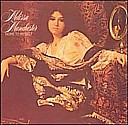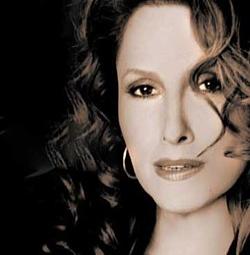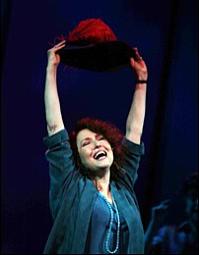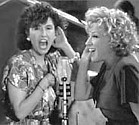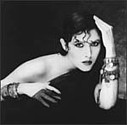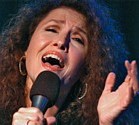
Close Encounters of the Celebrity Kind...
Melissa Manchester: Still Crazy (for Singing and Writing) After All These Years
Expanded Edition of the 6-20-07 WCT Interview
by Richard Knight, Jr.
Expanded Edition of the 6-20-07 WCT Interview
by Richard Knight, Jr.
Manchester Moods (Clockwise from L-R): A 2004 portrait, the cover of her debut 1973 album "Home to Myself," in 1991 with Bette
Midler in the film For the Boys, onstage in Chicago starring in "Hats!," belting it out, and her 80s look during the new wave decade
Midler in the film For the Boys, onstage in Chicago starring in "Hats!," belting it out, and her 80s look during the new wave decade
Singer/songwriter Melissa Manchester has been honing her vocal and songwriting craft throughout a career spanning over three
decades. After providing backing vocals for Bette Midler during the first incarnation of her Harlettes, Manchester’s voice became a
staple of AM pop radio. Throughout the 1970s she had huge hits beginning with her composition “Midnight Blue” and continuing with
“Through the Eyes of Love (Theme from Ice Castles)” and “Don’t Cry Out Loud.” Then in the early 80s Manchester became an
instant “80s lady” with her new wave hit “You Should Hear How She Talks About You” that garnered her a Grammy Award and set her
upon a new path. In the 90s Manchester pulled back from the pressures of the music business to renew and focus on raising her two
children.
In 2004 she released her first album of original material in years, the sophisticated and melodic “When I Look Down That Road” that
found her songwriting gift and passionate singing voice in peak condition. Since late April Manchester has been in Chicago starring
in “Hats!” the hit musical inspired by the renowned Red Hat Society. “Hats!” addresses the personal challenge for women of turning
50 in a culture that is to put it kindly, youth obsessed. Manchester has had a blast essaying the central role (and she and her
songwriting collaborator Sharon Vaughn also contributed to the show’s score) and says that she and her fellow cast members are
looking forward to their appearance in this Sunday’s gay pride parade. Manchester took time out of her eight show a week schedule
to chat. Highlights from our conversation:
WINDY CITY TIMES (WCT): 32 years ago, May of 1975 I was graduating from high school and the airwaves were filled with the
strains of your beautiful “Midnight Blue.” “Nightingale” by Carole King and “Lovin’ You” by Minnie Riperton had just been hits and “At
Seventeen” by Janis Ian was just about to break. When you look back now at the music climate then – was it more supportive for
singer/songwriters especially female ones than it is now?
MELISSA MANCHESTER (MM): You know, I don’t know about more supportive. We were all so very young and we were the first wave
of the female singer/songwriters in mainstream pop music so it’s not that I was welcomed with open arms. I mean, it took me
several years to get a record deal and prior to that I was paying hard dues in clubs all over the place. So I don’t know what the
relativity of it is like these days. I know that the packaging, the savvy is much more refined these days. We were more of an oddity
so that was sort of really interesting. There wasn’t the big machine that necessarily knew what to do with us yet since we were the
first wave. I don’t know about more supportive. It’s just that we were the first ones around.
WCT: Breaking new ground all over the place.
MM: I think so.
WCT: When I look over your history – correct me if I’m wrong – it seems that you came up through that Carole King-Brill Building
songwriting tradition.
MM: I was the generation after that. When I wrote with Carole Sager she was at the very end of the Brill Building and actually, I
think, wrote there for a very short time. But I certainly passed the Brill Building and knew of the people there.
WCT: Songwriters would learn their craft on the job so to speak. Is there anything today close to that model?
MM: I have no idea. I can’t pretend to even know how people are starting in the industry these days.
WCT: It just seems like a wonderment when you think back about all these amazing singer/songwriters in one place just writing
song after song.
MM: Well yes. When I was 17 years-old I became a staff writer at Chappell Music and my job was to, as I recall, write a song a
month or something like that. I was paid a salary which was lovely. Then I studied with Paul Simon in a songwriting class at NYU
which was unbelievable. So I don’t know what the models of how to become a songwriter these days is. I don’t know if it exists.
WCT: I know you later wrote a song about Paul Simon. What did you take away from that class – something that has stayed with
you?
MM: Oh yes, absolutely. Well, first of all it was extraordinary that he felt like teaching for those six months. I had been a student
at the NYU School of the Arts for one year and left but two friends of mine who had hired me to sing songs for them at various
publishing companies in order to get a publishing deal – one of whom was Jeffrey Sweet who I wrote “I Sent a Letter to My Love”
which was my first big song – and they saw this little sign up on the bulletin board in the hallway at NYU that Paul Simon was going to
be teaching songwriting and record production, they told me about it. Nobody could fathom that it was actually THE Paul Simon
(laughs) because “Bridge Over Troubled Water” was number one all over the galaxy at that point. But he auditioned everybody
himself and created this class of extremely disparate types who wanted to write all sorts of different songs from theatre to pop
songs, folk songs and what he taught me – what I took away from it – was essentially that all the plotlines of stories have been
written already. The only thing that will give you your stamp of authenticity is the way you tell the story. That really just stayed with
me and remains true.
WCT: It certainly has. You’ve had such a unique outlook and I mean that in a positive way. Speaking to that for a moment – you
had huge pop hits with “Midnight Blue,” “Don’t Cry Out Loud” and you wrote a lot of other songs that combined a lot of different
musical genres – very much in the Laura Nyro mode but with your own voice – so I’m wondering: would you rather had hit it “big” with
those more idiosyncratic songs – like “If It Feels Good” or “Bright Eyes” or songs like those?
MM: The thing is that you’re so shocked when something hits and you’re equally in shock when something doesn’t hit. So you’re in
a constant state of shock (laughs).
WCT (laughs): So you’re always being shocked!
MM: Yes. I mean, Laura Nyro was my muse. Growing up in New York City I’d never heard anybody create like she did – use music
and use words – language – like she did. That was the thing about being 17 in New York City. Everybody that was a teacher of mine
was actually being played on the radio. The works of Laura Nyro, the works of Joni Mitchell, the works of Sly & the Family Stone,
Stevie Wonder, James Taylor, the Beatles, it was just unbelievable who were on that first wave of singer/songwriters. Not just the
women but the men, too. They were reinventing what American pop music sounded like and particularly the women were infusing it
with such poetry and philosophy. And Laura had these flashes of such brilliance to capture what it was like to be a woman trying to
survive, find your own voice, how to connect with your feelings, negotiate the world. It was just unbelievable.
Would I wish that “Bright Eyes” was as popular as “Midnight Blue?” I have no feeling about that in a certain way because I was a
concert performer and when I would do “Bright Eyes” it would get a very large acknowledgement from the audience. What was
shocking was that when “Midnight Blue” came out people recognized the song from the introduction which was just…crazy because
that was really new and unbelievable. The only thing harder than having a first hit was trying to get a second (laughs) so it’s all
overwhelming and you’re mostly unprepared for any of it. There’s so much more calculation these days, it seems, and packaging
that I don’t know if younger performers have that same sense of shock and overwhelming-ness these days because there’s so much
more packaging put into not only who you are as a performer but what a radio station will even play. When “Midnight Blue” came
out it was before all the radio programming. It was a free-for-all of listeners choosing the songs and we worked really hard to get
things promoted. It may be the same these days. I don’t know.
WCT: This is exactly word for word what Laura Nyro told me when I interviewed her ten years or so ago…
MM: Oh my – lucky you.
WCT: Yes, I know, very, very lucky.
MM: You are one of the really lucky ones.
WCT: Yes, I am. She once said to me, “I feel like now music serves the business and when I started it was the other way around.”
Do you feel that, too?
MM: Oh yes indeed. I mean that’s one of the reasons I had to leave the industry because I just got very lost. I just could not…You
know, I guess I’ve been a part of first waves of things happening. I was part of the first wave of singer/songwriters but I was also in
that first wave of singer/songwriters who experienced the music industry when technology started to take over.
WCT: We're talking about new wave, obviously.
MM: Yes, in the early 80s and so your position as a singer became less important and that was very odd and it was very odd to not
quite know how to negotiate all of that techno stuff. The producers were having a great time because they had all kinds of new toys
to play with but as a writer I’m consistently fed by sitting in a room quietly with another collaborator and letting the song come out of
a discussion so that it has a very conversational feel to it. So I was not enthralled too much by having…and you know, Paul Simon
nailed it several years ago when said that what a song will be built on will change. He was totally a prophet in that way. He said that
in the past songs were melody driven and they have become rhythm driven and he was absolutely right.
WCT: Yes, he was dead on.
MM: Yes and when a song is rhythm driven it changes what a song is.
WCT: So in a sense, your Top Five hit “You Should Hear How She Talks About You” which won the Grammy and was so huge in a
way sort of slotted you in that direction. I’m imagining that you were “encouraged” to do that again.
MM: Yes.
WCT: Was it a bit of a blessing as well as a curse?
MM: I think so. It was very different for me and it was somewhat confusing to have a song like that so successful. A Grammy is a
wonderful thing, all of a sudden you’re given a new audience but like anything, you have to be able to grow with these songs if you
really want a long artistic career. I don’t do that song that often but when I do it’s been rearranged so it doesn’t sound the way it did
on the record. But it was funny that I was sort of the queen of aerobics classes.
WCT (laughs): That’s right!
MM (also laughing): And that’s fine. You know if you have a long enough career things are chapters and you have to know that.
You obviously see that in hindsight but you have to know that as you’re going through it and sometimes it’s hard to get that and
negotiate that as it’s happening.
WCT: It’s very interesting to equate the work from the 70s with the “Emergency” album cover from the 80s. You’re like the
quintessential 80s woman.
MM: Exactly.
WCT: And to see those two phases and then to listen to “When I Look Down the Road” from 2004 which is a beautiful work that I
can’t say enough about…
MM: Well that for me was like coming full cycle and returning to myself again. Its purpose for me was to create a quieter corner for
a world that is becoming increasingly cranky.
WCT: I love that description. You obviously think very carefully when considering your musical projects. What spoke to you about
“Hats” and made you want to be involved with it?
MM: It came to me by way of Doug Besterman. He had arranged my scores for Lady and the Tramp II and “I Sent a Letter to My
Love” and he was the musical director of “Hats” and he asked me on behalf of the creators if I would like to write a song for it. That
was a lovely idea so I contacted my theatre writing partner Sharon Vaughn and we were given this list of topics to choose from.
Sharon and I talked about it and the idea of being easily disposable in our society because you’re of a certain age – which is just
ridiculous and folly but of course the result of a youth crazed society – became very interesting. The idea of being invisible was the
point so we wrote the song “Invisible” and the creators of “Hats” liked it so much they asked us to write another song which was
based on the five stages of a woman’s life (which is in the Red Hat Society Handbook). When they were putting together the
Chicago performance they asked me if I would consider starring in it and my husband and I looked around the house and realized
that both of our kids were at college (laughs) so I said, “Sure!”
WCT: How important are gay audiences to you and have been to your career?
MM: Gay audiences are just fantastic. They can be very fickle but they are extremely loyal and they escort a diva (laughs) on the
path of her career and that is a beautiful thing! You know I would certainly love gay audiences to come and support “Hats” because
it speaks on so many levels to so many people. It’s not just for women who are part of the “Red Hat Society.” It’s about people
who feel ostracized from society, needing to find community, needing to feel support, and gay audiences will certainly identify with
my character Marian’s journey.
WCT: Let’s go back to one night in the early 70s when you were working at a club down the street from the Continental Baths and in
walks Barry Manilow with this young brash singer Bette Midler.
MM: Barry and I had known each other because we sang commercials – we were studio singers – but he was Bette’s music director
and she was indeed working down the street from where I was at the Continental Baths. On their night off they came to see me
because he wanted her to know me. She had never been a studio singer but that was always her dream and she had made her first
appearance on the Carson show by then. I finished my set and I went over to say hello to my friend of course and he introduced me
to Bette. I knew that she was getting ready for her first Carnegie Hall concert and of course that was thrilling and I asked her if she
was going to have any background singers. She took a beat and said, “I don’t know, would you like to sing in back of me?” and I
said, “Well, actually I’d like to sing instead of you (laughs) but I’ll be happy to sing in back of you.” So Barry and I organized what
was originally called The Red Light District and then we were called M.G.M. because those were our initials and then we were called
The Harlettes and I was the toots in the middle (laughs).
WCT: That’s great trivia. I did not know that.
MM: I worked for her for about six months.
WCT: Wonderful. So when is Barry Manilow going to produce the Melissa Manchester Songbook?
MM (laughs): That is so sweet. He actually just invited to me sing on his next project which was so dear and I will happily and we’ll
see. He’s going to have a whole bunch of famous divas singing backup, singing duets and he’s asked me to sing a duet which is
very exciting and I’m very touched.
WCT: That is very exciting. Last question: in 1973 you sang the beautiful lines “Now I don’t have the soul of Joni and I cannot see
myself like Miss Laura but I have found so much to please me and I guess that means I’m just funny that way.” Is that still true?
Do those lines still speak for you?
MM: Yes I think it’s totally true and I’m very touched that you would cite that line. You know all of us artists have to find our own
way and some people might say that my circuitous path has been more difficult than maybe another way that would have had
straighter lines connecting the dots. But you know, I just was not comfortable marching to anybody else’s drum and believe me, I
tried (laughs)!
decades. After providing backing vocals for Bette Midler during the first incarnation of her Harlettes, Manchester’s voice became a
staple of AM pop radio. Throughout the 1970s she had huge hits beginning with her composition “Midnight Blue” and continuing with
“Through the Eyes of Love (Theme from Ice Castles)” and “Don’t Cry Out Loud.” Then in the early 80s Manchester became an
instant “80s lady” with her new wave hit “You Should Hear How She Talks About You” that garnered her a Grammy Award and set her
upon a new path. In the 90s Manchester pulled back from the pressures of the music business to renew and focus on raising her two
children.
In 2004 she released her first album of original material in years, the sophisticated and melodic “When I Look Down That Road” that
found her songwriting gift and passionate singing voice in peak condition. Since late April Manchester has been in Chicago starring
in “Hats!” the hit musical inspired by the renowned Red Hat Society. “Hats!” addresses the personal challenge for women of turning
50 in a culture that is to put it kindly, youth obsessed. Manchester has had a blast essaying the central role (and she and her
songwriting collaborator Sharon Vaughn also contributed to the show’s score) and says that she and her fellow cast members are
looking forward to their appearance in this Sunday’s gay pride parade. Manchester took time out of her eight show a week schedule
to chat. Highlights from our conversation:
WINDY CITY TIMES (WCT): 32 years ago, May of 1975 I was graduating from high school and the airwaves were filled with the
strains of your beautiful “Midnight Blue.” “Nightingale” by Carole King and “Lovin’ You” by Minnie Riperton had just been hits and “At
Seventeen” by Janis Ian was just about to break. When you look back now at the music climate then – was it more supportive for
singer/songwriters especially female ones than it is now?
MELISSA MANCHESTER (MM): You know, I don’t know about more supportive. We were all so very young and we were the first wave
of the female singer/songwriters in mainstream pop music so it’s not that I was welcomed with open arms. I mean, it took me
several years to get a record deal and prior to that I was paying hard dues in clubs all over the place. So I don’t know what the
relativity of it is like these days. I know that the packaging, the savvy is much more refined these days. We were more of an oddity
so that was sort of really interesting. There wasn’t the big machine that necessarily knew what to do with us yet since we were the
first wave. I don’t know about more supportive. It’s just that we were the first ones around.
WCT: Breaking new ground all over the place.
MM: I think so.
WCT: When I look over your history – correct me if I’m wrong – it seems that you came up through that Carole King-Brill Building
songwriting tradition.
MM: I was the generation after that. When I wrote with Carole Sager she was at the very end of the Brill Building and actually, I
think, wrote there for a very short time. But I certainly passed the Brill Building and knew of the people there.
WCT: Songwriters would learn their craft on the job so to speak. Is there anything today close to that model?
MM: I have no idea. I can’t pretend to even know how people are starting in the industry these days.
WCT: It just seems like a wonderment when you think back about all these amazing singer/songwriters in one place just writing
song after song.
MM: Well yes. When I was 17 years-old I became a staff writer at Chappell Music and my job was to, as I recall, write a song a
month or something like that. I was paid a salary which was lovely. Then I studied with Paul Simon in a songwriting class at NYU
which was unbelievable. So I don’t know what the models of how to become a songwriter these days is. I don’t know if it exists.
WCT: I know you later wrote a song about Paul Simon. What did you take away from that class – something that has stayed with
you?
MM: Oh yes, absolutely. Well, first of all it was extraordinary that he felt like teaching for those six months. I had been a student
at the NYU School of the Arts for one year and left but two friends of mine who had hired me to sing songs for them at various
publishing companies in order to get a publishing deal – one of whom was Jeffrey Sweet who I wrote “I Sent a Letter to My Love”
which was my first big song – and they saw this little sign up on the bulletin board in the hallway at NYU that Paul Simon was going to
be teaching songwriting and record production, they told me about it. Nobody could fathom that it was actually THE Paul Simon
(laughs) because “Bridge Over Troubled Water” was number one all over the galaxy at that point. But he auditioned everybody
himself and created this class of extremely disparate types who wanted to write all sorts of different songs from theatre to pop
songs, folk songs and what he taught me – what I took away from it – was essentially that all the plotlines of stories have been
written already. The only thing that will give you your stamp of authenticity is the way you tell the story. That really just stayed with
me and remains true.
WCT: It certainly has. You’ve had such a unique outlook and I mean that in a positive way. Speaking to that for a moment – you
had huge pop hits with “Midnight Blue,” “Don’t Cry Out Loud” and you wrote a lot of other songs that combined a lot of different
musical genres – very much in the Laura Nyro mode but with your own voice – so I’m wondering: would you rather had hit it “big” with
those more idiosyncratic songs – like “If It Feels Good” or “Bright Eyes” or songs like those?
MM: The thing is that you’re so shocked when something hits and you’re equally in shock when something doesn’t hit. So you’re in
a constant state of shock (laughs).
WCT (laughs): So you’re always being shocked!
MM: Yes. I mean, Laura Nyro was my muse. Growing up in New York City I’d never heard anybody create like she did – use music
and use words – language – like she did. That was the thing about being 17 in New York City. Everybody that was a teacher of mine
was actually being played on the radio. The works of Laura Nyro, the works of Joni Mitchell, the works of Sly & the Family Stone,
Stevie Wonder, James Taylor, the Beatles, it was just unbelievable who were on that first wave of singer/songwriters. Not just the
women but the men, too. They were reinventing what American pop music sounded like and particularly the women were infusing it
with such poetry and philosophy. And Laura had these flashes of such brilliance to capture what it was like to be a woman trying to
survive, find your own voice, how to connect with your feelings, negotiate the world. It was just unbelievable.
Would I wish that “Bright Eyes” was as popular as “Midnight Blue?” I have no feeling about that in a certain way because I was a
concert performer and when I would do “Bright Eyes” it would get a very large acknowledgement from the audience. What was
shocking was that when “Midnight Blue” came out people recognized the song from the introduction which was just…crazy because
that was really new and unbelievable. The only thing harder than having a first hit was trying to get a second (laughs) so it’s all
overwhelming and you’re mostly unprepared for any of it. There’s so much more calculation these days, it seems, and packaging
that I don’t know if younger performers have that same sense of shock and overwhelming-ness these days because there’s so much
more packaging put into not only who you are as a performer but what a radio station will even play. When “Midnight Blue” came
out it was before all the radio programming. It was a free-for-all of listeners choosing the songs and we worked really hard to get
things promoted. It may be the same these days. I don’t know.
WCT: This is exactly word for word what Laura Nyro told me when I interviewed her ten years or so ago…
MM: Oh my – lucky you.
WCT: Yes, I know, very, very lucky.
MM: You are one of the really lucky ones.
WCT: Yes, I am. She once said to me, “I feel like now music serves the business and when I started it was the other way around.”
Do you feel that, too?
MM: Oh yes indeed. I mean that’s one of the reasons I had to leave the industry because I just got very lost. I just could not…You
know, I guess I’ve been a part of first waves of things happening. I was part of the first wave of singer/songwriters but I was also in
that first wave of singer/songwriters who experienced the music industry when technology started to take over.
WCT: We're talking about new wave, obviously.
MM: Yes, in the early 80s and so your position as a singer became less important and that was very odd and it was very odd to not
quite know how to negotiate all of that techno stuff. The producers were having a great time because they had all kinds of new toys
to play with but as a writer I’m consistently fed by sitting in a room quietly with another collaborator and letting the song come out of
a discussion so that it has a very conversational feel to it. So I was not enthralled too much by having…and you know, Paul Simon
nailed it several years ago when said that what a song will be built on will change. He was totally a prophet in that way. He said that
in the past songs were melody driven and they have become rhythm driven and he was absolutely right.
WCT: Yes, he was dead on.
MM: Yes and when a song is rhythm driven it changes what a song is.
WCT: So in a sense, your Top Five hit “You Should Hear How She Talks About You” which won the Grammy and was so huge in a
way sort of slotted you in that direction. I’m imagining that you were “encouraged” to do that again.
MM: Yes.
WCT: Was it a bit of a blessing as well as a curse?
MM: I think so. It was very different for me and it was somewhat confusing to have a song like that so successful. A Grammy is a
wonderful thing, all of a sudden you’re given a new audience but like anything, you have to be able to grow with these songs if you
really want a long artistic career. I don’t do that song that often but when I do it’s been rearranged so it doesn’t sound the way it did
on the record. But it was funny that I was sort of the queen of aerobics classes.
WCT (laughs): That’s right!
MM (also laughing): And that’s fine. You know if you have a long enough career things are chapters and you have to know that.
You obviously see that in hindsight but you have to know that as you’re going through it and sometimes it’s hard to get that and
negotiate that as it’s happening.
WCT: It’s very interesting to equate the work from the 70s with the “Emergency” album cover from the 80s. You’re like the
quintessential 80s woman.
MM: Exactly.
WCT: And to see those two phases and then to listen to “When I Look Down the Road” from 2004 which is a beautiful work that I
can’t say enough about…
MM: Well that for me was like coming full cycle and returning to myself again. Its purpose for me was to create a quieter corner for
a world that is becoming increasingly cranky.
WCT: I love that description. You obviously think very carefully when considering your musical projects. What spoke to you about
“Hats” and made you want to be involved with it?
MM: It came to me by way of Doug Besterman. He had arranged my scores for Lady and the Tramp II and “I Sent a Letter to My
Love” and he was the musical director of “Hats” and he asked me on behalf of the creators if I would like to write a song for it. That
was a lovely idea so I contacted my theatre writing partner Sharon Vaughn and we were given this list of topics to choose from.
Sharon and I talked about it and the idea of being easily disposable in our society because you’re of a certain age – which is just
ridiculous and folly but of course the result of a youth crazed society – became very interesting. The idea of being invisible was the
point so we wrote the song “Invisible” and the creators of “Hats” liked it so much they asked us to write another song which was
based on the five stages of a woman’s life (which is in the Red Hat Society Handbook). When they were putting together the
Chicago performance they asked me if I would consider starring in it and my husband and I looked around the house and realized
that both of our kids were at college (laughs) so I said, “Sure!”
WCT: How important are gay audiences to you and have been to your career?
MM: Gay audiences are just fantastic. They can be very fickle but they are extremely loyal and they escort a diva (laughs) on the
path of her career and that is a beautiful thing! You know I would certainly love gay audiences to come and support “Hats” because
it speaks on so many levels to so many people. It’s not just for women who are part of the “Red Hat Society.” It’s about people
who feel ostracized from society, needing to find community, needing to feel support, and gay audiences will certainly identify with
my character Marian’s journey.
WCT: Let’s go back to one night in the early 70s when you were working at a club down the street from the Continental Baths and in
walks Barry Manilow with this young brash singer Bette Midler.
MM: Barry and I had known each other because we sang commercials – we were studio singers – but he was Bette’s music director
and she was indeed working down the street from where I was at the Continental Baths. On their night off they came to see me
because he wanted her to know me. She had never been a studio singer but that was always her dream and she had made her first
appearance on the Carson show by then. I finished my set and I went over to say hello to my friend of course and he introduced me
to Bette. I knew that she was getting ready for her first Carnegie Hall concert and of course that was thrilling and I asked her if she
was going to have any background singers. She took a beat and said, “I don’t know, would you like to sing in back of me?” and I
said, “Well, actually I’d like to sing instead of you (laughs) but I’ll be happy to sing in back of you.” So Barry and I organized what
was originally called The Red Light District and then we were called M.G.M. because those were our initials and then we were called
The Harlettes and I was the toots in the middle (laughs).
WCT: That’s great trivia. I did not know that.
MM: I worked for her for about six months.
WCT: Wonderful. So when is Barry Manilow going to produce the Melissa Manchester Songbook?
MM (laughs): That is so sweet. He actually just invited to me sing on his next project which was so dear and I will happily and we’ll
see. He’s going to have a whole bunch of famous divas singing backup, singing duets and he’s asked me to sing a duet which is
very exciting and I’m very touched.
WCT: That is very exciting. Last question: in 1973 you sang the beautiful lines “Now I don’t have the soul of Joni and I cannot see
myself like Miss Laura but I have found so much to please me and I guess that means I’m just funny that way.” Is that still true?
Do those lines still speak for you?
MM: Yes I think it’s totally true and I’m very touched that you would cite that line. You know all of us artists have to find our own
way and some people might say that my circuitous path has been more difficult than maybe another way that would have had
straighter lines connecting the dots. But you know, I just was not comfortable marching to anybody else’s drum and believe me, I
tried (laughs)!
